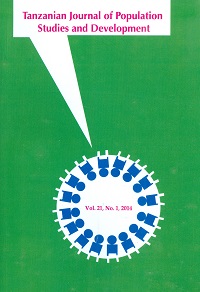Employee Perceptions of Job Conditions in Explaining Employee Job Satisfaction: A Stakeholder ' s Perspective
Abstract
This study examines employee perceptions of job conditions in their workplaces in explaining an organisation ' s employee-outcomes. It argues that when employees have positive perceptions of various workplace conditions, their attitudes influence their perceived job satisfaction. The study examines the extent to which employees consider important various employment conditions in the workplace and relate these attitudes towards their job satisfaction. It hypothesizes that employees ' perceptions of fairness in workplaces mediate the relationship between perceptions of job conditions and employees ' job satisfaction. Data for employee attitudinal measures was collected by soliciting employee surveys from five different centres of financial and higher education institutions in Tanzania. The study concludes that there is a positive relationship between positive employee perceptions towards employment conditions and perceived job satisfaction.
References
Amit, R. & P.J.H. Schoemaker. 1993. Strategic Asset and Organizational Rent. Strategic Management Journal, 14, 33 €“46.
Anderson, J. 1989. Corporate Social Responsibility. New York: Quoram Books.
Appelbaum, E., T. Bailey, P. Berg & A. Kalleberg. 2000. Manufacturing Advantage: Why High Performance Work Systems Pay Off. Ithaca, NY: ILR Press.
Arawati, A. & A. Mokhtar. 2000. The Mediating Effect of Customer Satisfaction on Total Quality Management Practices and Financial Performances. Singapore Management Review, 22(2): 55 €“73.
Barney, J. 1991. Firm Resources and Sustained Competitive Advantage. Journal of Management, 17(1): 99 €“120.
Benson, B. W., W. N. Davidson. 2010. The Relation between Stakeholder Management, Firm Value, and CEO Compensation: A Test of Enlightened Value Maximization. Journal of Financial Management, September, 22.
Berg, P., E. Appelbaum, T. Bailey & A. Kalleberg. 1996. The Performance Effects of Modular Production in the Apparel Industry. Industrial Relations, 35(3): 356 €“373.
Blau, P. 1964. Exchange and Power in Social Life. New York: John Wiley.
Boxall, P. & K. Macky. 2007. High-performance Work Systems and Organizational Performance: Bridging Theory and Practice. Asia Pacific Journal of Human Resources, 45(3): 261 €“270.
Burke, K. & S. Leben. 2007. Procedural Fairness: A Key Ingredient in Public Satisfaction. A white paper of the American Judges Association the Voice of the Judiciary. Court Review, 44.
Choi, J. & H. Wang. 2009. Stakeholder Relations and the Persistence of Corporate Financial Performance. Strategic Management Journal, 30: 895 €“907.
Colquitt, J. A. & J.B. Rodell. 2011. Justice, Trust, and Trustworthiness: A Longitudinal Analysis Integrating Three Theoretical Perspectives. Academy of Management Journal, 54(6): 1183 €“1206.
Delery, J. E. & H. D. Doty. 1996. Modes of Theorizing in Strategic Human Resource Management: Test Of Universalistic, Contingency, and Configurational Performance Predictions. Academy of Management Journal, 39: 802 €“836.
Edmondson, A. & B. Moingeon. 1998. When to Learn How and When to Learn Why: Appropriate Organisational Learning Processes as a Source of Competitive Advantage. Organisational Learning and Competitive Advantage. London: Sage; pp 7 €“15.
Evans, W. R. & Davis, W. D. 2005. High-performance Work Systems and Organizational Performance: The Mediating Role of Internal Social Structure. Journal of Management, 31(5): 758 €“775.
Freeman, R. E. 1984. Strategic Management: A stakeholder Approach. Boston: Pitman Publishing.


